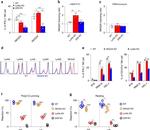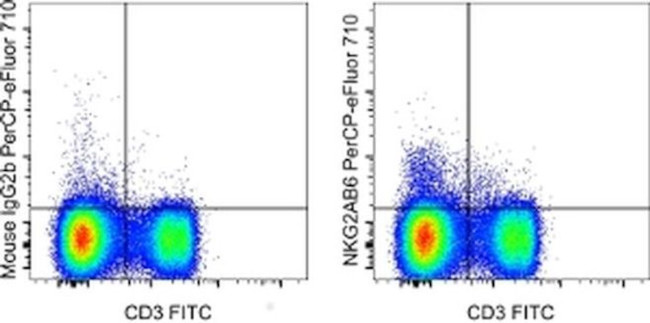Search Thermo Fisher Scientific
Invitrogen
NKG2AB6 Monoclonal Antibody (16a11), PerCP-eFluor™ 710, eBioscience™
FIGURE: 1 / 4
NKG2AB6 Antibody (46-5897-82) in Flow




Product Details
46-5897-82
Species Reactivity
Published species
Host/Isotype
Recommended Isotype Control
Class
Type
Clone
Conjugate
Excitation/Emission Max
Form
Concentration
Purification
Storage buffer
Contains
Storage conditions
Shipping conditions
RRID
Product Specific Information
Description: The 16a11 monoclonal antibody reacts with the mouse NKG2A^B6. NKG2 molecules belong to a C-type lectin-like family of cell surface receptors expressed by mouse NK and NKT cell lineages. NKG2 molecules form heterodimeric complexes with CD95 and are responsible for recognition of non-classical MHC class I antigen Qa-1. This antibody reacts with the C57Bl/6 mouse strain, but does not react with the BALB/c or 129 mouse strains.
When co-staining with NKG2A/C/E clone 20d5, it is important to stain for NKG2A^B6 first then subsequently with NKG2A/C/E, as steric hindrance has been observed if co-stained concurrently.
Applications Reported: This 16a11 antibody has been reported for use in flow cytometric analysis.
Applications Tested: This 16a11 antibody has been tested by flow cytometric analysis of mouse splenocytes. This can be used at less than or equal to 1 µg per test. A test is defined as the amount (µg) of antibody that will stain a cell sample in a final volume of 100 µL. Cell number should be determined empirically but can range from 10^5 to 10^8 cells/test. It is recommended that the antibody be carefully titrated for optimal performance in the assay of interest.
PerCP-eFluor® 710 emits at 710 nm and is excited with the blue laser (488 nm); it can be used in place of PerCP-Cyanine5.5. We recommend using a 710/50 bandpass filter, however, the 695/40 bandpass filter is an acceptable alternative. Please make sure that your instrument is capable of detecting this fluorochrome.
Light sensitivity: This tandem dye is sensitive to photo-induced oxidation. Please protect this vial and stained samples from light.
Fixation: Samples can be stored in IC Fixation Buffer (Product # 00-8222) (100 µL of cell sample + 100 µL of IC Fixation Buffer) or 1-step Fix/Lyse Solution (Product # 00-5333) for up to 3 days in the dark at 4°C with minimal impact on brightness and FRET efficiency/compensation. Some generalizations regarding fluorophore performance after fixation can be made, but clone specific performance should be determined empirically.
Excitation: 488 nm; Emission: 710 nm; Laser: Blue Laser.
Filtration: 0.2 µm post-manufacturing filtered.
Target Information
Natural killer (NK) cells are lymphocytes that can mediate lysis of certain tumor cells and virus-infected cells without previous activation. They can also regulate specific humoral and cell-mediated immunity. The protein encoded by this gene belongs to the killer cell lectin-like receptor family, also called NKG2 family, which is a group of transmembrane proteins preferentially expressed in NK cells. This family of proteins is characterized by the type II membrane orientation and the presence of a C-type lectin domain. This protein forms a complex with another family member, KLRD1/CD94, and has been implicated in the recognition of the MHC class I HLA-E molecules in NK cells. The genes of NKG2 family members form a killer cell lectin-like receptor gene cluster on chromosome 12. Four alternatively spliced transcript variants encoding two distinct isoforms have been observed.
For Research Use Only. Not for use in diagnostic procedures. Not for resale without express authorization.
How to use the Panel Builder
Watch the video to learn how to use the Invitrogen Flow Cytometry Panel Builder to build your next flow cytometry panel in 5 easy steps.
Bioinformatics
Protein Aliases: Cluster of Differentiation 159a; NKG2-A/NKG2-B type II integral membrane protein
Gene Aliases: CD159a; NKG2A; NKG2B
Entrez Gene ID: (Mouse) 16641

Performance Guarantee
If an Invitrogen™ antibody doesn't perform as described on our website or datasheet,we'll replace the product at no cost to you, or provide you with a credit for a future purchase.*
Learn more
We're here to help
Get expert recommendations for common problems or connect directly with an on staff expert for technical assistance related to applications, equipment and general product use.
Contact tech support

